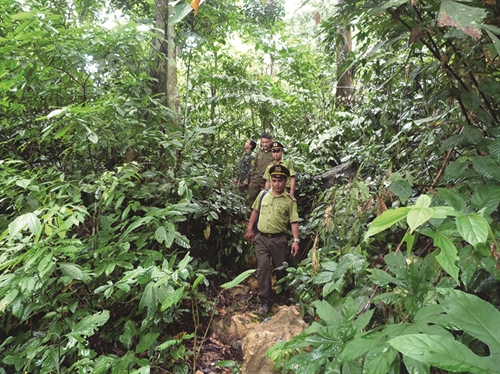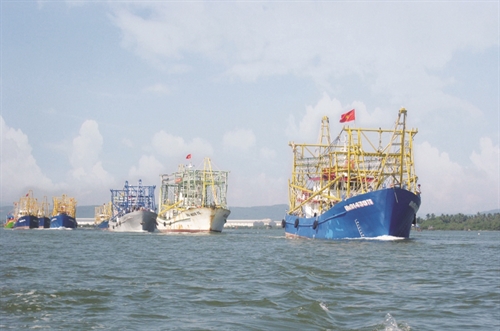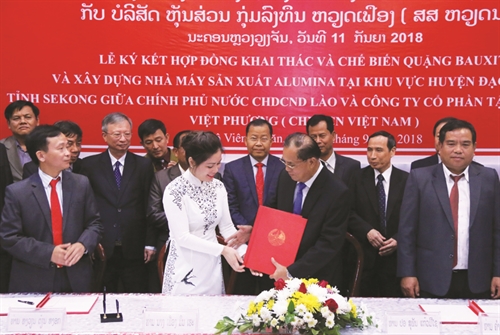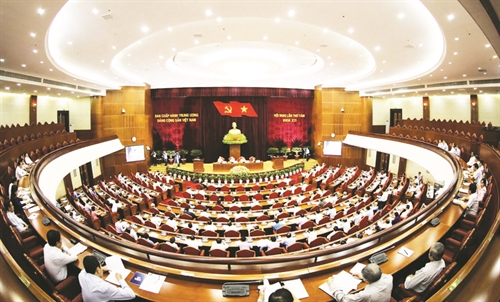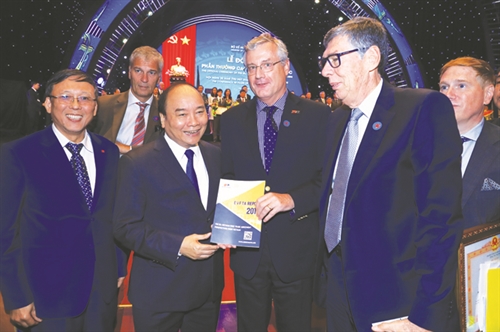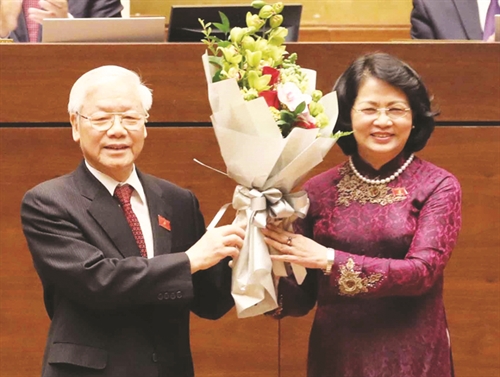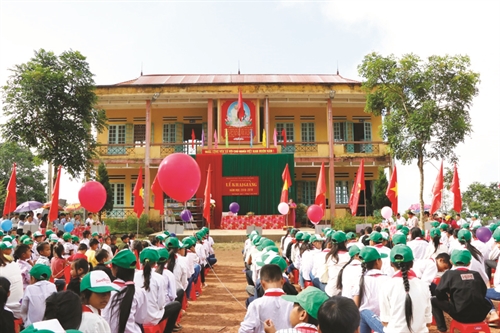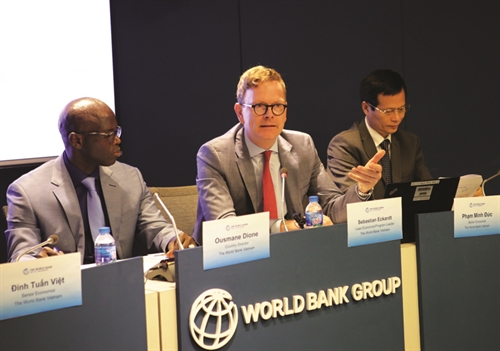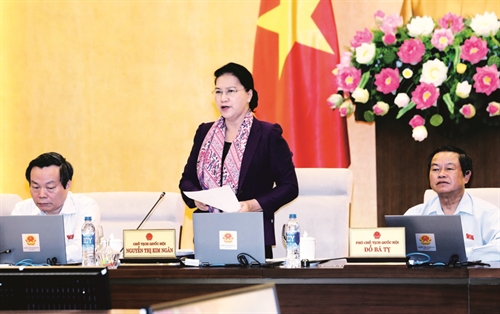Dr. Dinh Huu Phi
Director General
National Office of Intellectual Property of Vietnam
Ministry of Science and Technology
Against the backdrop of rapid development of science and technology, intellectual property (IP) has become one of powerful tools for countries to raise the competitiveness of their businesses and national economies. As for Vietnam, it is a must to increase the effectiveness of IP activities to seize opportunities and overcome challenges facing the country in the course of national development and international integration.
Vietnam’s IP system and IP activities
Until now, intellectual property rights (IPRs) of organizations and individuals have been recognized and protected under international law and the laws of almost all countries in the world. This helps encourage activities of creating and disseminating scientific and technological advances as well as cultural and art works to serve socio-economic development and improve the quality of life. IP has actually played the key role of a driving force for accelerating innovative and creative activities, thus developing national intellectual assets both quantitatively and qualitatively, contributing to raising creative capacity, and building a sound competitive environment.
In Vietnam today, at the central level, the IP system is constituted of three specialized sectors managed by three authorities. The Ministry of Science and Technology, with the National Office of Intellectual Property of Vietnam (IP Vietnam) acting as the focal point, takes charge of industrial property as well as general IP-related issues. The Ministry of Culture, Sports and Tourism, via the Copyright Office of Vietnam (COV), performs the state management of copyright and related rights. Meanwhile, the Ministry of Agriculture and Rural Development, with a focal point being the Plant Variety Protection Office under the Department of Crop Production, is responsible for protection of plant variety rights. At the local level, provincial-level People’s Committees perform the state management of IP through specialized agencies being departments of science and technology; culture, sports and tourism; and agriculture and rural development.
At the time when Vietnam applied for accession to the World Trade Organization (WTO), the country’s IPRs protection system was operating mainly based on sub-law documents, including the 1989 Ordinance on Protection of Industrial Property Rights and the 1994 Ordinance on Protection of Copyright. In order to meet the requirements for legal completeness and effectiveness under the WTO Agreement on Trade-Related Aspects of Intellectual Property Rights (the TRIPS Agreement) and other bilateral and multilateral agreements on IP to which the country had acceded, in 2005, Vietnam adopted the Law on Intellectual Property, integrating all IP regulations into a single specialized law/text/instrument. Thanks to the promulgation of the Law and guiding texts, including 17 governmental decrees and 19 ministerial and inter-ministerial circulars, the Vietnam’s legal system on IP has not only reached the standards set in acceded treaties but also got closer to the IP systems of advanced countries in the world.
So far, Vietnam has become a member of several treaties being the core of the international IP system such as the Paris Convention for the Protection of Industrial Property, the Berne Convention for the Protection of Literary and Artistic Works, the Rome Convention for the Protection of Performers, Producers of Phonograms and Broadcasting Organizations, the International Convention for the Protection of New Varieties of Plants, and the Stockholm Convention for Establishing the World Intellectual Property Organization. The country has also joined a number of treaties on facilitation of the international registration of IPRs like the Patent Cooperation Treaty and the Madrid Agreement and the Protocol for the International Registration of Marks and is now on the road to accession to the Hague System for the International Registration of Industrial Designs.
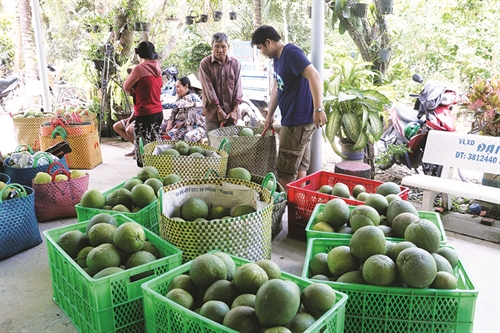 |
| Farmers in Ben Tre province collect green pomelos, a local specialty with protected status, for export__Photo: Huynh Phuc Hau/VNA |
The first milestone in Vietnam’s international cooperation in the IP field was the signing of the ASEAN Framework Agreement on Intellectual Property Cooperation in 1995. After that, in parallel with WTO accession negotiations, Vietnam proceeded with establishing cooperation in the field of IP with other countries in the world, signing bilateral agreements with Switzerland in 1999, the US in 2000, and Japan and Russia in 2008, as well as a series of agreements on cooperation in science and technology with IP provisions. Since then, along with the trend of global economic integration, IP has gradually become an important and integral part of new-generation free trade agreements. In order to keep up with the situation, Vietnam has tried to play a proactive and positive role in negotiations for several new-generation free trade agreements, of which two agreements, signed with the Eurasian Economic Union and the Republic of Korea, have come into force while the remaining four are awaiting ratification or under negotiation.
In addition to the development of the IP system, the country also sees step-by-step improvement in IP activities.
With regard to the establishment of industrial property rights, in 10 years from the effective date of the Intellectual Property Law (2006-16), the number of industrial property applications filed to the IP Vietnam increased by 10-15 percent per year. During the same period, the Department of Crop Production received 927 applications for protection of plant variety rights and granted 432 certificates.
In the field of copyright, under Vietnam’s law, registration for copyright and related rights is not a compulsory procedure for enjoyment of rights. However, being aware of the benefits of registration of copyright and related rights, many authors and right holders have proactively filed applications for certificates. By the end of 2015, the COV had granted a total of 43,450 certificates, including 43,321 certificates of copyright and 129 certificates of related rights, with an annual increase rate of around 6 percent.
Regarding IPRs protection, although IPRs are, by nature, civil rights, the employment of civil measures in protection of IPRs remains limited. According to statistics of the Supreme People’s Court, from July 2006 through September 2016, the court system had adjudicated just 174 civil cases involving IP-related disputes and settled 200 IP-related business and trade disputes. Moreover, with the advantages of requiring less time, simpler procedures and lower costs, administrative measures are still the key tool in protection of IPRs. During 2012-15, inspectors of the culture, sports and tourism sector had administratively handled 386 cases of infringement upon copyright and related rights, imposing a total fine of over VND 9 billion. Science and technology inspectorates had handled 473 cases of industrial property violations, levying a fine amount of roughly VND 6 million. The market surveillance force under the Ministry of Industry and Trade had inspected and dealt with around 22,500 cases involving counterfeit goods and IPRs-infringing goods, collecting nearly VND 53 billion of fine to the state coffers. At the same time, criminal measures had been applied to those who commit acts of intentionally counterfeiting trademarks or geographical indications, pirating copyright or related rights at commercial scale, or committing violations with the value of counterfeit or pirated goods or the amount of illicit profits or damage reaching the threshold for penal liability examination.
In order to facilitate IP activities, Vietnam has established an agency to take charge of industrial property assessment, i.e., the Vietnam Intellectual Property Research Institute (VIPRI) under the Ministry of Science and Technology. From September 2009 through 2016, the VIPRI had given assessment opinions on more than 3,800 cases and matters.
In addition, the country has adopted a raft of policies/initiatives to support and promote the creation, transfer and dissemination of intellectual assets, many of which have been integrated into laws. For example, the policy on grant of autonomy to science and technology organizations and businesses and grant of the right to register, manage and exploit inventions to research project owners; the policy and mechanism on sharing of rights and benefits in public-private cooperation projects; the policy to encourage and exploit inventions created with state funds; and the policy on support for development of intellectual assets at businesses, etc.
However, limitations are still seen in IP activities in Vietnam.
As the IP system is composed of three bodies managing three different fields of IPRs, the management of IP activities is somehow uncentralized, incoherent and unsystematic. It is not to mention the lack of mechanisms for inter-agency coordination. Until now, the system of legal documents on IP has remained cumbersome and complicated with guiding documents issued by authorities of different levels. As a result, some provisions are inconsistent and unclear, while others are infeasible or unsuitable to realities, making them difficult to implement.
Formalities for establishment and enforcement of rights constitute another problem. The processing of applications for establishment of industrial property rights is often prolonged beyond the law-prescribed time limit and not yet conducted in a public and transparent manner, thus restricting access to information by applicants and the public. Regarding protection of IPRs, although many agencies are competent to sanction administrative violations, none of them is assigned to act as the main focal point. As each of these agencies is responsible for a specialized field or a specific stage of the production-consumption cycle, the update and exchange of information among them can hardly be promptly implemented, while there remain overlaps in their tasks and responsibilities. The court system still lacks qualified and experienced human resources, thus failing to timely and effectively handle complicated IP cases and matters. Meanwhile, the mechanism for settlement of disputes through mediation and arbitration has not yet been fully brought into play.
Difficulties in IP activities may also stem from limitations in public awareness about protection of IPRs. People, organizations and enterprises still fail to take the initiative in protecting their own rights and to respect the rights of others. When their rights are infringed upon, rights holders and industrial property representatives often hesitate to initiate lawsuits at court but prefer to seek administrative measures to settle their cases.
Solutions for improving IP activities
First of all, it is crucial to underline the viewpoint that intellectual assets of Vietnam as well as of the mankind should be used as leverage to boost technological renewal and improve competitiveness. Hence, increasing of the quality and ensuring overwhelming effectiveness of IP activities are regarded as a constant requirement and a top priority in developing Vietnam’s IP system into an “open and dynamic” system capable of adapting to changes and development of the economy while ensuring positive and proactive integration into the world in the IP field. In the context of the ongoing Fourth Industrial Revolution, the IP system should be developed based on advanced technology platforms, e.g., the Internet of Things and artificial intelligence, while attaching importance to the building of high-quality human resources - a key factor in guaranteeing the succeed of IP activities.
In light of this, during 2019-30, efforts should be concentrated on implementing the several groups of tasks concerning IP policies and laws, state management of IP, protection of IPRs, exploitation of IPRs for economic growth and innovative and creative capacity improvement, and support for IP activities, with the following eight specific solutions.
First, public communication activities should be further renewed with a view to raising social awareness about IP so that all people and businesses can understand the importance of IP in encouraging creative activities and helping create valuable intellectual assets, promote technology transfer, increase productivity and quality, create highly competitive products and boost socio-economic development. In addition, IP knowledge should be taught at universities and high schools.
Second, policies should be further implemented to encourage and support enterprises to exploit and transfer rights to use intellectual assets. At the same time, the law on transactions of intellectual assets and mechanisms and policies on sharing and balancing benefits among related stakeholders should be improved so as to properly handle the relations between invention owners and the community and between plant variety rights holders and producers, traders and farmers, among others.
Third, it is necessary to increase investment and raise the efficiency of investment in IP activities. To this end, technologies should be modernized to serve the establishment and protection of IPRs. In addition, a national intellectual asset development support fund should be formed to push up creative activities and support the application and transfer of intellectual assets.
Fourth, the system of agencies acting as the focal points in protection of IPRs should be streamlined and specialized. Furthermore, legal provisions on IP, especially those on enforcement and protection of IPRs, should be improved toward restricting the use of administrative tools while promoting the application of civil measures in settlement of IP-related disputes. Administrative penalties would only be imposed as an additional punishment besides civil penalties in case IP infringements fall beyond the civil liability threshold.
Fifth, the role of the State in management in protection of IPRs should be enhanced. State management agencies should effectively and closely work with other related organizations and individuals to improve the IP law, thus laying a firm legal basis for encouraging and protecting creative activities. IP monitoring and governance tools should be effectively used, while new technologies, especially information technology, should be further applied in professional operations in the IP field.
Sixth, supporting activities that aim to promote and protect IPRs should be extended. For example, to formulate and develop models on association between universities/research institutes and enterprises and operate a network of IP and technology transfer centers at universities and research institutes, together with forming non-public non-business units providing IP services, etc.
Seventh, it is necessary to improve the quality of IP human resources through renewing and enhancing the training of the personnel specialized in IP, especially those working at IPRs enforcement agencies.
Last, international integration and cooperation in the IP field should be promoted. Specifically, Vietnam should cooperate with and make the full use of assistance from bilateral and multilateral partners in the IP field with a view to training and improving the country’s IP human resources, developing an information collection and provision system for state management agencies and IPRs enforcement agencies, and raising the public’s sense of respect for IPRs. The country should also exchange and share experience and information on commercialization of intellectual assets with other countries in the world, try to play a more positive and proactive role in international forums on IP, take part in negotiations on establishment of international IP institutions, and conclude bilateral agreements concerning IP.-
2. Decree 103/2006/ND-CP of September 22, 2006, detailing and guiding a number of articles of the Law on Intellectual Property regarding industrial property;
3. Decree 104/2006/ND-CP of September 22, 2006, detailing and guiding a number of articles of the Law on Intellectual Property regarding plant variety rights;
4. Decree 105/2006/ND-CP of September 22, 2006, detailing and guiding a number of articles of the Law on Intellectual Property regarding protection of intellectual property rights and state management of intellectual property;
5. Decree 106/2006/ND-CP of September 22, 2006, on sanctioning of administrative violations in the field of industrial property;
6. Decree 88/2010/ND-CP of August 16, 2010, detailing and guiding a number of articles of the Law on Intellectual Property and the Law Amending a Number of Articles of the Law on Intellectual Property regarding plant variety rights;
7. Decree 97/2010/ND-CP of September 21, 2010, on sanctioning of administrative violations in the field of industrial property;
8. Decree 119/2010/ND-CP of December 30, 2010, amending a number of articles of Decree 105 of 2006, detailing and guiding a number of articles of the Law on Intellectual Property regarding protection of intellectual property rights and state management of intellectual property;
9. Decree 122/2010/ND-CP of December 31, 2010, revising a number of articles of Decree 103 of 2006, detailing and guiding a number of articles of the Law on Intellectual Property regarding industrial property;
10. Decree 85/2011/ND-CP of September 20, 2011, amending and supplementing a number of articles of Decree 100 of 2006, detailing and guiding a number of articles of the Civil Code and the Law on Intellectual Property regarding copyright and related rights;
11. Decree 01/2012/ND-CP of January 4, 2012, revising, replacing or annulling regulations on administrative procedures under the management of the Ministry of Culture, Sports and Tourism;
12. Decree 99/2013/ND-CP of August 29, 2013, on sanctioning of administrative violations in the field of industrial property;
13. Decree 131/2013/ND-CP of October 16, 2013, on sanctioning of administrative violations related to copyright and related rights;
14. Decree 31/2016/ND-CP of May 6, 2016, on sanctioning of administrative violations in the fields of plant varieties, and plant protection and quarantine;
15. Decree 28/2017/ND-CP of March 20, 2017, amending and supplementing a number of articles of Decree 131 of 2013, on sanctioning of administrative violations related to copyright and related rights and Decree 158 of 2013, on sanctioning of administrative violations in the fields of culture, sports, tourism and advertising;
16. Decree 22/2018/ND-CP of February 23, 2018, detailing a number of articles of, and measures to implement, the 2005 Law on Intellectual Property and the Law Amending a Number of Articles of the Law on Intellectual Property regarding copyright and related rights;
17. Decree 154/2018/ND-CP of November 9, 2018, amending, supplementing and annulling a number of provisions on investment and business conditions in the field of state management of the Ministry of Science and Technology and a number of provisions on specialized inspection.-
